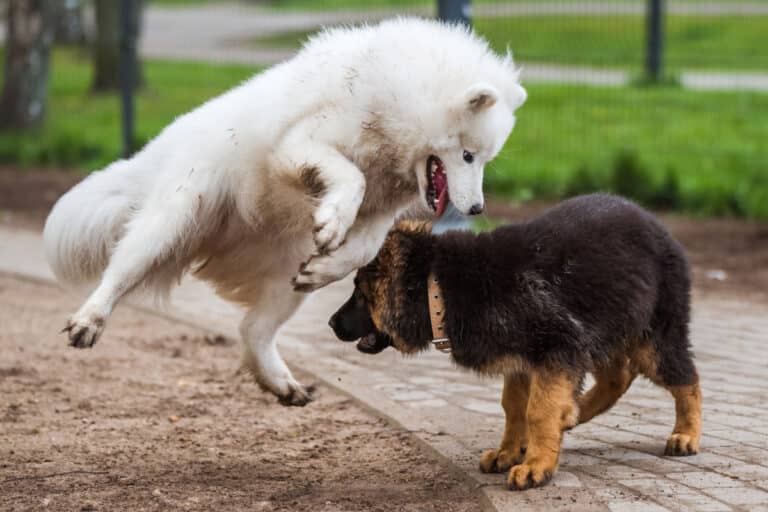Among Samoyed dog owners, there is a contention over whether they can assault their humans aggressively. Some people say that these dogs make good family pets when they are trained well. On the other hand, people say that these dogs can be dangerous too if you take them out and are not on a leash.
If you never had a Samoyed before or are just planning to have one soon, hearing such things about the breed can leave you taken aback. It will make you want to know the truth behind the scuttlebutt.
It can even come to a point that you will question your own decision if you are doing the right thing to have this dog breed into your home as a family pet. If you don’t know anything about the Samoyed breed or its history, you’d grope in the dark.
So, which is it? Are Samoyeds risky to own or not? Would it be possible to let them roam about in a nearby park without a leash? This article will take a closer look at this aspect of Samoyed ownership and let you be the judge yourself.
Are Samoyeds Protective?
Samoyeds are protective of their human families, just like any other breed of dog. They don’t belong to the “aggressive” group of canine breeds. But they will bark and alert their family to get their attention when they perceive that “danger” is at hand.
Samoyeds enjoy a good reputation as reliable watchdogs. They will do everything in their power to protect their homes and families from intruders.
But, they can’t do a good job as guard dogs. Hence, they should not be left alone on their own to protect your property. It is because these dogs are just way too friendly, they may even wag their tail at a potential intruder.
Samoyeds are loyal, loving, and protective of their families and make excellent companion dogs.
How Protective Are Samoyeds?
Many people think that Samoyed dogs are natural-born canine protectors. If you go back in time, you’ll see that these dogs were bred to guard reindeer herds against the various predators that roamed the Siberian wild. These predators include wolves, lynx, and tigers. From this springs the strong instinct of a Samoyed dog to defend its pack.
They are protector dogs yet are not aggressive. Unless they feel threatened, they will not attack anyone or anything. If you are looking for a dependable guard dog, there are better breeds out there. Make the Samoyed breed an exemption to that. But, if you want a loyal and loving companion for everyone in your household, a Samoyed is a great choice.
Will a Samoyed Protect Its Owner?
In general, the Samoyeds are gentle and friendly dogs. So, you can’t expect them to be “aggressive”. Yet, these dogs are very loyal to their family and will do anything in their power to protect them.
They will also bark out loud at their humans to warn them if there is an impending risk or danger they perceive coming their way. So, if you are looking for a guard dog to protect you or your family, a Samoyed is a top contender.
But make sure you give them an ample amount of socialization while they are young. It will help them know what kind of behavior is acceptable for you when the both of you are in the company of strangers. This can be a life-saving skill for them, for all you know.
Why Train a Samoyed Dog How to Behave When in the Company of Strangers?
It is very important to train a Samoyed dog on how to behave when they’re in the company of strangers. If not properly trained, they may bark excessively. Sometimes, it even lays the groundwork for them to become aggressive. You should start doing this while they are young, in their developmental phase.
Proper socialization will help them become confident and comfortable around strangers. Training them will make them less likely to bark or act aggressively in their adult life.
Additionally, obedience training is a must for any Samoyed owner. Why? It is because behavior training will teach your dog how to properly respond to basic commands such as sit, stay, come, and down. In the presence of strangers or when guests arrive at your house, these commands will prove to be helpful in keeping your dog under control.
There are a few different ways you can do this:
1. Socialize Them Young. This means exposing them to different people, places, situations, and animals. Doing so will help them keep their cool and not be rattled by new people, new experiences, and new things.
2. Train With Positive Reinforcement. This means rewarding them when they opt to display their good behavior. Most especially when they are surrounded by strangers. If you give them any kind of corporal punishment, you instill fear in them instead. They will fear you and that might make them keep their distance from you.
3. Be Consistent with commands. If you tell your Samoyed to sit and stay, make sure you always do this when a stranger is around. This will help them understand that they need to act their best and behave well when someone they don’t know is around.
4. Supervise Them Around Strangers. It is important that you still supervise your Samoyed dog when they are in the company of new, unfamiliar people. This will help prevent any accidents from happening.
5. Keep Strangers Away from your home. If you do not want your Samoyed to bark boisterously at strangers, it is best to keep them away from your property altogether. This may mean putting up a fence or keeping your dog inside the house. Or you can also have your Samoyed in their crate when people come over.
The tips shared above will help your Samoyed behave properly around strangers.
Are Samoyed Dogs Territorial?
Samoyed dogs can be territorial. They are very protective of their human family and home. Thus, they may bark or growl at strangers who come. Yet, they are not aggressive by nature and will usually back down if the stranger is friendly and does not pose a threat.
Moreover, Samoyeds are also very social dogs. They enjoy being around people, so they are not likely to become territorial unless they feel threatened in some way.
If you have a Samoyed, it is important to socialize with them from an early age. If you do so, they will learn how to interact properly with people and animals they don’t know or are not familiar with.
Territorial behavior can be managed with proper training and socialization. So if you are concerned about your Samoyed’s behavior, be sure to speak with a veterinarian or dog trainer. A professional from this field can advise you further on what to do.
Do Male Samoyeds Mark Their Territory?
Most male Samoyeds will mark their territory by urinating on objects or areas that they consider to be their own. This behavior is instinctive in the canine universe and is not something that can be trained out of them.
If you have a male Samoyed, it is best to provide him with an outdoor space that he can call his “own” so that he does not feel the need to mark anything indoors.
But if you have a female Samoyed, she will probably not have an urge to mark anything as hers or her territory. It is not an instinct or behavior in the female canine community.
Are Samoyeds an Aggressive Breed?
Because of their size and history as working dogs, some would inevitably see Samoyed dogs as an aggressive canine breed. Yet, in complete contrast to this wrong notion about them, Samoyeds are very gentle, they are a very friendly breed.
Samoyeds are known for being great with children and other animals. They are generally very mild-tempered. Of course, every dog is an individual, so there is always the potential for aggression in any dog. But know that this characteristic, being aggressive, is not typically seen in Samoyeds.
If you’re worried about Samoyed’s “hostility”, you may want to have a word with a certified professional trainer.
While Samoyeds may not be qualified as an aggressive breed, they do have a lot of energy and sometimes they can run into mischief. To “neutralize” their naturally perky spirit, you need to give them an adequate amount of exercise and mental stimulation daily. Doing so will help them to stay happy and healthy.
If you’re thinking about adding a Samoyed to your family, be prepared to give them lots of love and attention. With proper care, they’ll make loyal and loving companions for life.
How Aggressive Are Samoyeds?
Samoyeds are not typically aggressive dogs, but like all animals, they can have moments when they lash out. They do this when they are feeling threatened or anxious, and it is important to be aware of their body language so you can avoid these situations.
Unsocialized Samoyeds are likely to become aggressive dogs. Thus, it’s critical to begin socializing with them at an early age. Expose them to a variety of people, experiences, situations, and animals. If you see signs that your Samoyed is becoming agitated, remove them from the situation and give them some time to calm down.
With proper training and socialization, Samoyeds can be friendly and loving pets. And most dogs are, regardless of breed.
If you are considering adopting a Samoyed, it is important to be aware of their potential for aggression. You should take the necessary measures to ensure that your dog is properly socialized. See to it also that he will go through basic behavior training. Such measures will help your pooch be the household pet dog that you want them to become.
Can Samoyed Dogs Be Aggressive?
Samoyed dogs are not typically aggressive, but they can be if they feel threatened or if they’re not properly socialized. The most common reason for aggression in Samoyeds is fear or insecurity. This dread or uneasiness is frequently caused by a lack of socialization. Simply put, they are not adequately socialized with other animals and people.
If you’re considering getting a Samoyed, make sure you socialize them early and often so that they don’t become aggressive.
If your Samoyed has not been properly socialized, they may be fearful of new situations and people. This can lay the groundwork for possible aggression. Another reason Samoyeds may become aggressive is if they feel threatened or if they want to protect their territory. Male Samoyeds may also become aggressive during the mating season.
Fear is often the root cause of aggression in dogs. Thus, you need to make sure your Samoyed feels comfortable and safe around people and other animals. If you think your dog is acting aggressively, take them to the vet so they can rule out any medical causes. Once you’ve ruled out a medical cause, you can work with a trainer to help your dog overcome their aggression.
Do Samoyeds Bite?
Samoyeds do not bite on purpose. They are not known to bite or attack people. These dogs are infrequently aggressive, even to smaller critters. If pushed to their limits, then they may nip. This particular canine breed is known for its gentle nature and very loving towards the members of its human family.
Sammies are great even with children and other pets. They are bred as working dogs, and their mouths are designed for tasks such as pulling sleds and herding reindeer. But, like any dog, they may nip if they feel threatened or if they’re playing too roughly. If that happens, know that it is not intentional and you shouldn’t point a blaming finger at them.
If you have a Samoyed, it’s important to socialize them well so they learn how to interact properly with people and animals.
How Hard Can a Samoyed Bite?
Well, it all depends on how much pressure the dog is exerting. The jaws of a Samoyed are incredibly strong, and if the dog bites down with all its might, it could easily break into the skin.
But, keep in mind that Samoyeds are relatively gentle dogs. They only use their mouths for playing and chewing on toys but not for biting or attacking humans or smaller animals. So unless you’re doing something annoying to your Samoyed (like pulling its tail hard), you may push them to their limit and thus nip at you. Therefore, don’t give them any reason to bite you and they won’t.
Still, it’s always best to be cautious around any dog – even the friendliest ones can sometimes snap if they’re feeling threatened or scared. If you’re ever in doubt, just put your hand out slowly and let the Samoyed sniff it before proceeding to pet it. That way, you’ll know for sure that the dog is comfortable with you before moving forward.
How Do You Stop a Samoyed From Biting?
If your Samoyed is biting, it could be a sign of excitement, fear, or even aggression. To stop your dog from his biting tendencies, you will need to identify first where such behavior is stemming from.
Once you know why your dog is biting, you will know how to work on correcting the behavior. If your Samoyed is biting out of excitement, you can try to redirect his attention to a toy or treat.
But if your dog is biting out of fear or aggression, you may need to consult with an experienced trainer or animal behaviorist. It is because these professionals are the only ones who can effectively help address this issue.
Regardless of the reason for your Samoyed’s biting, it is important to remain calm and consistent when working to correct the behavior. You may prevent your Samoyed from biting someone by using patience and positive reinforcement.
Can You Walk a Samoyed Off-Leash?
There’s no doubt that Samoyeds are beautiful dogs. They’re also strong, independent, and intelligent. So, can you walk a Samoyed off-leash?
The answer is maybe. It depends on the individual dog and its training. Some Samoyeds may be able to walk calmly by your side off-leash, while others may be more likely to wander off or pull on the leash.
The best way to find out if your Samoyed can walk off-leash is to try it out in a safe, controlled environment with plenty of supervision. If your dog does well, then you can gradually increase the amount of time and distance you’re apart. However, if your dog seems uncomfortable or stressed without a leash, then it’s best to stick to leashed walks.
Walking a Samoyed off-leash can be a great way to bond with your dog and give them some exercise and mental stimulation. However, it’s important to make sure that your dog is comfortable and confident without a leash before you try it in a more public setting.
If you’re not sure whether your dog is ready for an off-leash walk, always err on the side of caution and keep them on a leash.
Can Samoyeds Be Trained Off-Leash?
A Samoyed dog can be trained to walk off-leash. But, it is important to note they’re not known for being highly independent and stubborn. So, extra patience and consistency are necessary when trying to teach them this skill.
You may start by teaching them simple obedience instructions first like how to sit, stay, and come to you on command. Once your Samoyed has mastered those simple commands, you can walk your dog off-leash. But do it in a safe and controlled environment (like your fenced garden area) with minimal distractions.
While it is possible to train a Samoyed off-leash, it may require more patience and effort than if the dog were on a leash. Off-leash training spells greater danger too since there is an increased risk of the dog running away. They can get lost if they do so. Due to such reasons, it is important to consider whether off-leash training is right for you and your Samoyed.
Remember to praise and reward your dog whenever they display good and desired behavior. With time and patience, your Samoyed will learn to walk politely by your side even when they’re not on a leash.
Are Samoyeds Escape Artists?
Samoyeds are known to be escape artists. They are very intelligent and curious dogs, so don’t be so surprised if they keep finding ways to escape from your yard or home. If you have a Samoyed, it is important to make sure that your fence is secure enough and that your dog will not ever find a way to sneak out.
Also remember to keep an eye on your dog when you take them outside, as they may try to run away if they see an opportunity. A curious Samoyed dog is likely to chase away smaller animals that come across them and catch their attention.
Overall, Samoyeds are among the most wonderful dog pets to have in any household. Prepare yourself, though, because these dogs are known as great escape artists.
Do Samoyeds Need a Fence?
The answer is… maybe. It depends on the individual dog. Some Samoyeds are perfectly content to lounge around in the yard without any type of barrier. Others, however, are escape artists who will jump or dig their way out given the chance.
If you’re considering a Samoyed, be sure to do your research first. Find out if the particular dog you’re interested in having is known for being a Houdini. If so, you’ll likely need to invest in a good fence.
If you happen to have a picket fence in your backyard, consider upgrading it first before getting a Samoyed pup. It is because they are no match to a Samoyed being the great escape artist that they are.
When it comes to fences, there are a few things to keep in mind. First, Samoyeds are medium to large dogs, so you’ll need a fence that’s tall enough to deter them from jumping over. Second, they’re also known for being diggers, so a fence with buried wire or underground fencing is often necessary.
Last but not least, remember that even the best fence won’t keep a determined dog in if he wants out. If you have your heart set on a Samoyed, be prepared to supplement your fence with daily walks and plenty of exercises. With the right amount of love and attention, any dog can be a great addition to the family.
Can Samoyeds Jump Fences?
Just like any other dog breed, Samoyeds are capable of jumping fences. Even high ones.
However, it is important to note that not all Samoyeds will be able to jump extremely high fences. Some may only be able to clear low fences, while others may be able to clear taller fences with ease. Ultimately, it depends on the individual dog’s athleticism and physical capabilities if they can get over a high fence or not.
If you’re concerned about your Samoyed jumping a fence, there are a few things you can do to deter them from doing so.
First, make sure the fence is tall enough that they cannot simply jump over it. Secondly, you can try installing a fence topper such as chicken wire or spikes to make it more difficult for them to get over. Finally, you can train your Samoyed not to jump fences by teaching them the “stay” or “come” commands.
With patience and consistency, you should be able to successfully train your dog not to jump fences.
How High Can Samoyeds Jump?
Samoyeds are known for their awesome athletic abilities, and they are often able to jump quite high. As far as the Samoyed’s jumping ability goes, no one knows for sure, but some estimates put it at as much as 6 feet high (or 1.8 m). This impressive feat is likely due to the breed’s powerful legs and strong back muscles.
If you have a Samoyed, be sure to provide plenty of opportunities for them to exercise their jumping skills in a safe environment!
If you’re wondering how high your own Samoyed can jump, the best way to find out is to simply give them a little encouragement and see how they do. With a little practice, you may be surprised at just how high your furry friend can jump!
Will Samoyeds Run Away?
One of the most common questions potential Samoyed owners ask is whether or not these dogs will run away. The answer to this question is hinged on several factors. This may include the individual dog’s temperament and past experiences. In general, however, Samoyeds are not prone to running away from home.
The Samoyed dogs are bred to work closely with humans, and they typically form strong bonds with their human families. They are also very intelligent and docile, so they usually respond well to commands and stay close by when told to do so. That said, there are always exceptions to every rule, and there is always the potential for any dog – no matter what breed – to run off if given the opportunity.
The best way to prevent your Samoyed from running away is to provide him with a safe, secure home where he feels happy and loved. Make sure he has plenty of toys and activities to keep him occupied and give him plenty of attention and affection. If you do these things, it’s unlikely that your Samoyed will ever want to leave your side.
Can Samoyeds Be Dangerous and Mean in Any Way?
Samoyeds are one of the most gentle and friendly dog breeds around. However, like any other dog breed, they can become aggressive in the absence of proper socialization at an early age. They are also likely to take on a hostile nature if they feel threatened.
Proper training and socialization are essential for all dogs, but it is especially important for Samoyeds. Without proper socialization, Samoyeds may become fearful of people and other animals. When that happens, the anxiety they feel can lay the groundwork for aggression to get the best of them.
If you are planning to adopt a Samoyed anytime soon, be sure to talk to your veterinarian or a professional trainer. They can demonstrate to you how to socialize your new pet properly. And do it while he is a puppy. This way, you can be sure that he will become well-mannered in his adult years.








